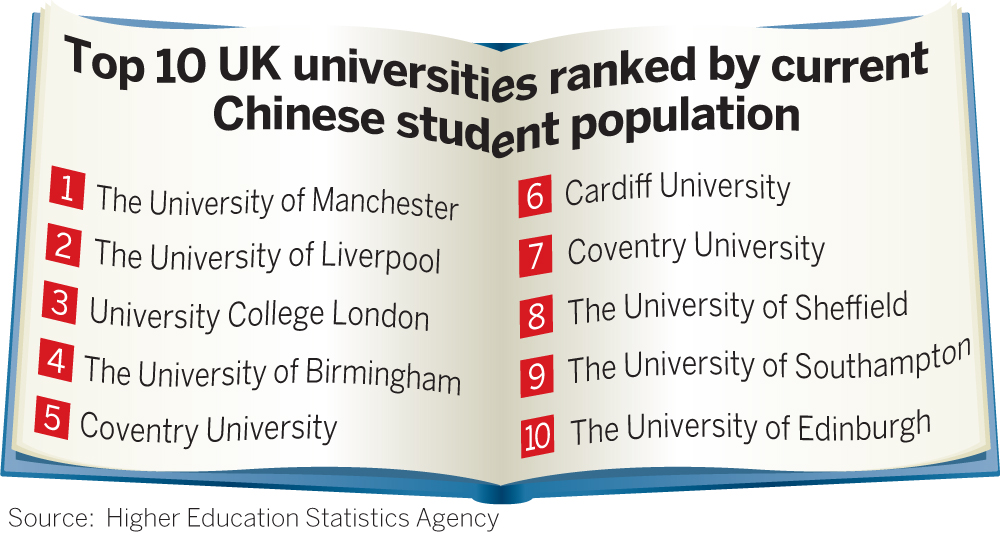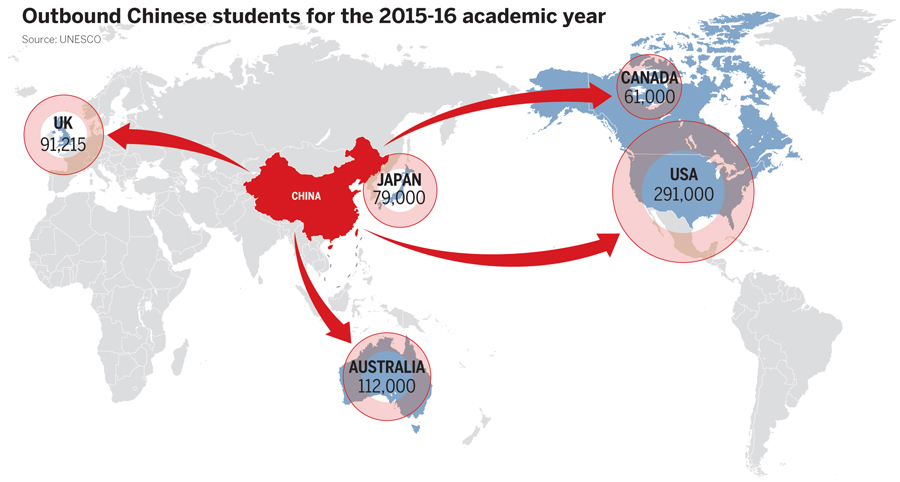Chinese students flock to UK universities

Chinese students are flocking to United Kingdom universities at record levels as British education institutions increase their overseas marketing efforts to secure funding amid Brexit worries.
A report by the lobbying body Universities UK International in the build-up to the new academic year has revealed that nearly one in five overseas students at universities in the UK comes from China.
In the 2016-17 academic year, UK universities welcomed 95,090 Chinese students, by far the biggest international student cohort. By comparison, the UK's second-biggest overseas student cohort, from the United States, was 17,580.

Education industry experts say the numbers are set to grow further, thanks to the UK government and universities' China-focused strategies.
In June this year, new measures to simplify the student visa application process, especially for Chinese students, came into effect.
Another new policy this year allowed graduates from 23 selected UK universities to apply for a six months post-study work visa. The ability to gain valuable work experience in the UK is very attractive for Chinese students, and adds value to their CV even if they return to China to work in the longer term.
"Universities are keen to attract Chinese and other international students in recent times, because Brexit means many universities could lose research funding from European Union institutions," said Colin Chen, managing director of InterGreat Education Group, a London-based education consultancy.

For example, British universities receive about 15 percent of funding from the European Commission's Horizon 2020 program, which is a research fund established to allocate 80 billion euros ($93.6 billion) to cutting-edge science research between 2014 and 2020.
British universities are now anxiously waiting for Brexit negotiations to confirm if they are still eligible.
Faced with such funding pressure, British universities are increasingly investing in a China recruitment effort, and establishing research partnerships with Chinese universities.
Their effort comes at an opportune time, particularly as in recent years more British high schools are setting up campuses in China, effectively raising the profile of British education. Currently, 296 of the 661 international schools in China teach the British A-level curriculum to students, according to the Beijing based NewSchool Insight Media.
"Chinese students at these schools will, over time, develop a sense of familiarity with the UK, so the UK becomes a natural destination when choosing to study abroad," said Chen.
Student experience

Gaining an internationally recognized degree, the opportunity to experience British culture, and developing an international perspective are among the top factors attracting Chinese students to the UK.
"As China internationalizes, its demand for globally-minded talent has also grown," said May Huang, CEO of UK Education Weekly, a London-based education-focused Chinese language publication. "Therefore, many students want to study abroad to improve their employability, and to build up an international network of contacts who can help them in their career."
The benefits of studying in the UK are already felt by many Chinese students.
"I've never regretted my decision to study in the UK. It was my UK student experience that helped me to find what I want to do for life," said Zhang Feng, a PhD student at the University of Greenwich.
Zhang first came to the UK in 2013 at the age of 23, for a one-year abroad experience during his undergraduate degree at Anhui University.
He planned to stay for just the one year, but instead decided to stay for his masters and PhD degrees. Looking back, Zhang said the key benefits from his UK study experience were improvement of his English, critical thinking and research skills, and teamwork and leadership skills.
Yan Feifei, a PhD student at London's School of Oriental and African Studies, said that the incredibly high academic standards of UK education pushed her to reach for her potential.
"I was mentally prepared for a big work load, but I really did not realize how absolutely demanding my classes are until I started," said Yan, who majors in comparative literature.
Every week, she needs to read two novels and analyse notes on one poet. It all equates to about 1,000 pages of reading.
Xu Shuning, a mathematics student at Imperial College, agrees.
"I developed self-studying abilities, time management skills and communication skills with people from different backgrounds," Xu said.
Behind the growth of the outbound Chinese student numbers is the rising wealth level of the Chinese middle class.
"Overseas education used to be a luxury accessible only by the elites, but now it is common and easily achievable," said Huang.
According to Education Ministry statistics, 544,500 Chinese studied abroad in the 2016-17 academic year, more than triple the 179,800 that sought out education overseas in 2008.
Currently, the US dominates the Chinese outbound student market, followed by Australia and the UK. In the 2015-16 academic year, the US received 291,000 Chinese students, Australia received 112,000, and the UK received 91,215 students.
In addition to growing student numbers, Huang said new cohorts of Chinese students in the UK are also coming to the UK at younger ages, and making more diverse degree choices.
In other words, the number of Chinese students applying for undergraduate degrees has grown faster than for masters, and figures for arts and social sciences courses are rising faster than for the more historically popular business degrees.
"Coming at younger ages often enable students to stay in the UK for a longer and gain a fuller British student life experience," said Huang. "In comparison, those students coming to the UK for just one year to pursue a master's degree may find their experience quite rushed."
Whereas a decade ago about 60 percent of Chinese students in the UK studied economics and business-related subjects, this proportion has dropped to around 40 percent in recent years. Traditionally less popular subjects, including creative art and design, are now studied by more students.
"It is encouraging to see that Chinese students are making more varied choices of subjects. It shows that younger generations of Chinese students are perhaps more independent in their thinking and more informed about subject choices," said Huang.
Universities' perspective
For British universities, Chinese and other international students provide a crucial source of income. A recent study by University College London's Centre for Global Higher Education found that overseas students add around 20 billion pounds ($25.54 billion) to the UK economy each year.

In addition, international students contribute cultural diversity to British universities, said Jonathan Pitt, International Partnerships and Recruitment Officer at St Mary's University.
"Chinese students at our university act as a crucial bridge for our other students to better understand China," said Pitt. "We are also consciously building up our Chinese alumni network. Our Chinese alumni can help our efforts to strengthen our reputation in China, and that can open doors to new joint-teaching and research partnership opportunities between us and Chinese universities."
Charles Cao Quin, deputy pro-vice-chancellor at the University of Leicester, agrees.
"Chinese students' respect for teachers, their learning attitude and abilities, are all qualities that can inspire and encourage their classmates," he said.
Despite the continued growth, the recent occurrences of terrorism attacks in the UK has made some prospective students feel concerned about choosing to study in the UK, said Ding Shan, deputy general manager of the Walkite International Academy, a London-based education company.
"Chinese students and parents care very much about safety," said Ding, who works on a daily basis to advise students and parents on applying for UK universities.
In the UK in 2017, attacks at Westminster Bridge, Manchester Arena, London Bridge and a mosque in north London killed 36 people.
Ding said: "Recent events in the UK have perhaps made some students feel it is unsafe to live in the UK. Therefore it is not surprising that some students choose Australia over the UK, especially if they are looking to stay permanently to work after graduation."

































